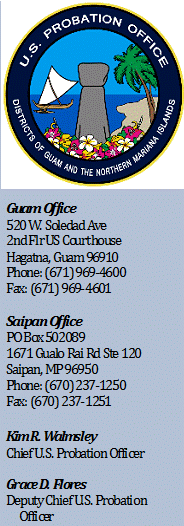About Federal Probation
The United States Probation Service is an agency that services the United States District
Courts in all 94 judicial federal districts nationwide and constitutes the community corrections
arm of the Federal Court System. The first legislation for Federal Probation Law was introduced
in 1909, one of which was prepared by the New York State Probation Commission and the
National Probation Association (later known as the American Probation and Parole Association).
This first attempt did not pass and through 1909 to 1925 there were 34 bills introduced to
establish federal probation law.
On March 4, 1925, the Federal Probation Act was signed into law by President Calvin Coolidge. This Act gave the U.S. Courts the power to appoint Federal Probation Officers and authority to sentence defendants to probation instead of a prison sentence. It later gave U.S. Probation Officers the responsibility of supervising offenders granted parole by the United States Parole Commission, military offenders and pretrial supervision.
U.S. Pretrial Services came along more than 50 years later, in 1982, with the Pretrial Services Act of 1982. It was developed as a means to reduce both crimes committed by persons released into the community pending trial and unnecessary pretrial detention. Some districts have both a separate U.S. Probation and Pretrial Services Offices.
There are 94 U.S. District Courts nationwide, which includes the U.S. Territories. U.S. Probation and Pretrial Services are located in 93 of them. (Probation and Pretrial Services for the District of Northern Mariana Islands are provided by the District of Guam.) United States Probation Officers, also referred to as Federal Probation Officers, are the only cadre of Federal Law Enforcement Officers unique to the Federal Judiciary. Despite their law enforcement status and authority within the federal government, their investigators are referred to as Officers, not Special Agents. The Federal Probation Office emphasizes their unique role as law enforcement officers and social case workers. They hold the responsibility to investigate and supervise persons charged with and convicted of crimes against the United States.
On March 4, 1925, the Federal Probation Act was signed into law by President Calvin Coolidge. This Act gave the U.S. Courts the power to appoint Federal Probation Officers and authority to sentence defendants to probation instead of a prison sentence. It later gave U.S. Probation Officers the responsibility of supervising offenders granted parole by the United States Parole Commission, military offenders and pretrial supervision.
U.S. Pretrial Services came along more than 50 years later, in 1982, with the Pretrial Services Act of 1982. It was developed as a means to reduce both crimes committed by persons released into the community pending trial and unnecessary pretrial detention. Some districts have both a separate U.S. Probation and Pretrial Services Offices.
There are 94 U.S. District Courts nationwide, which includes the U.S. Territories. U.S. Probation and Pretrial Services are located in 93 of them. (Probation and Pretrial Services for the District of Northern Mariana Islands are provided by the District of Guam.) United States Probation Officers, also referred to as Federal Probation Officers, are the only cadre of Federal Law Enforcement Officers unique to the Federal Judiciary. Despite their law enforcement status and authority within the federal government, their investigators are referred to as Officers, not Special Agents. The Federal Probation Office emphasizes their unique role as law enforcement officers and social case workers. They hold the responsibility to investigate and supervise persons charged with and convicted of crimes against the United States.

